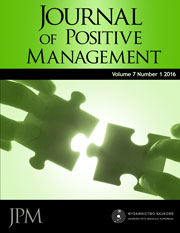THE ROLE OF MILITARY LEADERSHIP IN STRATEGIC COMMUNICATION (STRATCOM)
DOI:
https://doi.org/10.12775/JPM.2016.002Słowa kluczowe
strategic communication, military leadership, information environment, principles, key leaders’ engagement, positive managementAbstrakt
The aim of the paper is to present the role of military leadership in Strategic Communication (StratCom). The contents of the paper include the major shift in understanding military operations and their environment, the main idea of StratCom and its evolution, and the essential StratCom functional areas. Having the background established, the paper discusses the principle of the key leaders’ involvement (engagement). The principle is a fundamental prerequisite for effective StratCom, which proves the importance of military leadership in this field. The paper also includes the practical and theoretical implications referring to the assumptions of the positive management concept.
Bibliografia
AD 95–2 (2009), ACO Strategic Communications, Supreme Headquarters Allied Powers Europe, 19 November.
AJP-3.10 (2009), Allied Joint Doctrine for Information Operations, NATO Standardization Agency, November.
AJP-3.10.1 (2014), Allied Joint Doctrine for Psychological Operations, NATO Standardization Agency, September.
JP 3–13 (2014), Information Operations, U.S. Joint Chiefs of Staff, 20 November, available at: http://www.dtic.mil/doctrine/new_pubs/jp3_13.pdf (accessed 16 March 2015).
Kacała, T. (2012), “Komunikacja strategiczna”, Przegląd Morski, No. 3, pp. 17–27.
Lipińska, J., Kacała, T. (2014), Komunikacja strategiczna i Public Affairs, Wojskowe Centrum Edukacji Obywatelskiej, Warszawa.
Łydka, W. (2014), Przywództwo wojskowe, Wojskowe Centrum Edukacji Obywatelskiej, Warszawa.
MC 422/3 (2007), NATO Military Policy on INFO OPS, NATO Standardization Agency. Morrow, D., Conger S. (2015), “Exploring Meaningfulness in Work: Why Sensitivity Matters”, Journal of Positive Management, Vol. 6 No. 4, pp. 3–14, available at: http://www.jpm.umk.pl/index.php?option=com_content&view=article&id=204&Ite mid=226 (accessed 10 August 2016).
NATO Bi-SC Information Operations Reference Book (2010), NATO.
NATO Military Concept for Strategic Communications (2010), Allied Command Transformation, 27 July.
“Origins of the term Public Diplomacy”, available at: http://pdaa.publicdiplomacy. org/?page_id=6 (accessed 31 January 2015).
PO 0141 (2009), NATO Strategic Communications Policy, NATO International Staff, 29 September.
QDR Execution Roadmap for Strategic Communication (2006), U.S. Department of State, Washington DC, available at: http://www.dtic.mil/dtic/tr/fulltext/u2/a495367.pdf (accessed 16 March 2015).
Report of Defense Science Board Task Force on Strategic Communication (2004), U.S. Department of Defense, Washington DC, available at: http://www.dtic.mil/gettr-doc/pdf?AD=ADA476331 (accessed 16 March 2015).
Stankiewicz, W. (2012), “Dyplomacja publiczna – amerykański punkt widzenia”, Historia i Polityka, Vol. 7 No. 14, pp. 101–121, available at: http://apcz.pl/czasopisma/ index.php/HiP/article/view/1475 (accessed 16 March 2015). DOI: http://dx.doi. org/10.12775/1475
Stavridis, J. G. (2007), “Strategic Communication and National Security”, Joint Force Quarterly, Vol. 46, pp. 4–7, available at: http://www.dtic.mil/doctrine/jfq/jfq-46.pdf (accessed 16 March 2015).
Strategic Communication in Multinational Coalition Operations Within a Comprehensive Approach. Working Draft. Version 1.0 (2009), Strausberg, 30 November.
Van Elst, D., Meurs D. (2015), “Positive Management: The Relationship Between The Psychological Contract, Employee Engagement and Organisational Commitment”, Journal of Positive Management, Vol. 6 No. 4, pp. 39–52, available at: http:// www.jpm.umk.pl/index.php?option=com_content&view=article&id=207:article- 81&Itemid=229 (accessed 10 August 2016).
Pobrania
Opublikowane
Jak cytować
Numer
Dział
Licencja
Copyright
Articles submitted to the journal should not have been published before in their current or substantially similar form, or be under consideration for publication with another journal. Authors submitting articles for publication warrant that the work is not an infringement of any existing copyright and will indemnify the publisher against any breach of such warranty. For ease of dissemination and to ensure proper policing of use, papers and contributions become the legal copyright of the publisher unless otherwise agreed.
Plagiarism and ghostwriting
In response to the issue of plagiarism and ghostwriting the editors of the Journal of Positive Management has introduced the following rules to counteract these phenomena:
1. Contributors should be aware of their responsibility for a content of manuscripts.
2. Collective authors are obliged to reveal the contribution and an affiliation of each author (i.e. who is an author of specified part of a paper).
3. Any act of dishonesty will be denounced, the editors will inform appropriate institutions about the situation and give evidence of all cases of misconduct and unethical behaviour.
4. The editors may ask contributors for financial disclosure (i.e. contribution of specified institutions).
Statystyki
Liczba wyświetleń i pobrań: 950
Liczba cytowań: 0



